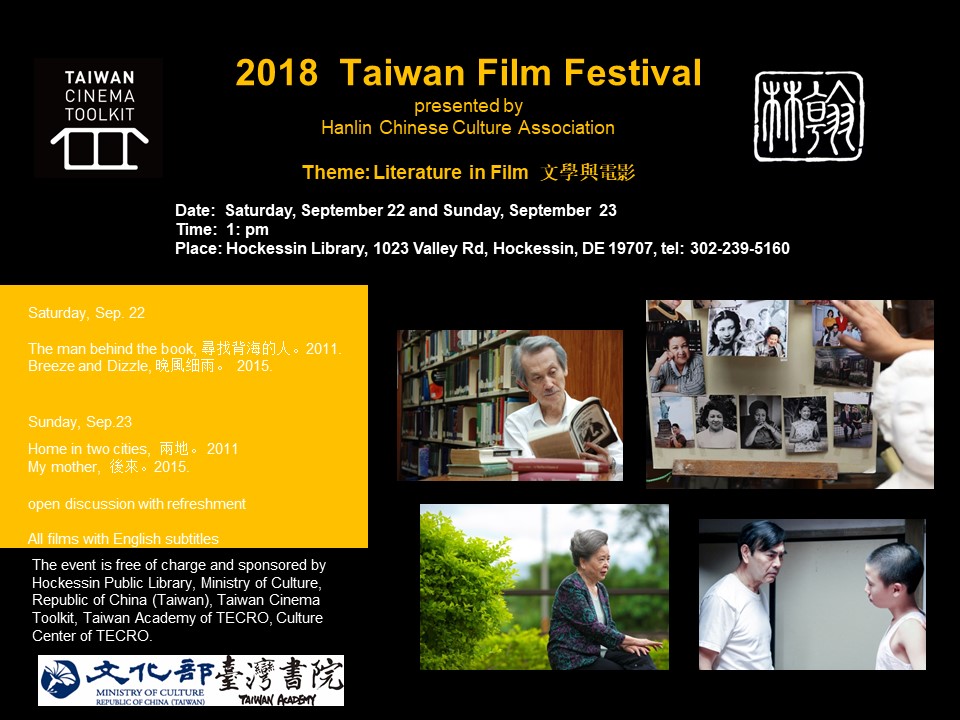

|
Year of OX Feb 20-28 ~~~~~~~~~~~~~~~ Learn more about the art of tea drinking ~~~~~~~~~~~~~~~ Learn more about the art of Chinese Flower Arrangement |

|
[ Home ] [ About Us ] [ Contact Us ] [ Events ] [ Archived Events ] [ Flower Arrangement ] [ Art of Tea Drinking ] © Copyright Hanlin Chinese Culture Association, Hockessin, DE 19711 |

|
~~~~~~~~~~~~~~~~~~~~~~~~~~~~~~~~~~~~~~~~~~~~
2018 Taiwan Film Festival Introduction
The man behind the book , 尋找背海的人, Director, Lin Jing-Jie, 林靖傑 2011, 105 min The film probes the mind of WANG Wen-Xing, the modernist pioneer who is long considered Taiwan's most enigmatic novelist. Writing only about 30 characters a day, his creative process seems slow and arduous, but the results fiercely subverted the literary conventions of his time. Back in 1960, he founded the trailblazing magazine Modern Literature with his peers, marking him as an iconic author in the literary history of Taiwan. His novels include Family Catastrophe published in 1973, and Backed Against the Sea, which took him 25 years to finish. The film connects the various highlights of WANG’s writing career, mapping the trajectory of an extraordinary creative mind. 夜復一夜,小說家和文字奮力搏鬥,身處斗室內,掏著胸臆內的泥土,構築繁盛的文學國度。從1973年出版《家變》,到歷時二十五年完成《背海的人》,王文興的文字風格大膽前衛、詰屈聱牙,被喻為現代文學美學的極致之作,是台灣現代主義小說巨擘。 在圖書館的密排書架間、校園內佈滿參差花樹的歧路上,王文興緩步慢行,娓娓道來對藝術的敏銳感受和洞見。數十年來,他每日只寫三十餘字,從未間斷,對自己特立獨行的創作路線,王文興解釋:「我不是標新立異,而是絕處求生。」 他信守自己的文字信仰、珍重對待寫作,以緩慢換取深刻,用雕鑿棗核的不懈精神,將思緒、情感化為記號,再翻譯為文字。本片追尋王文興的發跡歷程,串聯他浩瀚的文學生涯,在大銀幕上刻劃出一代文學家身影。
DVD source:Taiwan Cinema Toolkit, Ministry of Culture, R.O.C.
Breeze and Dizzle , 晚風細雨, Director, An Je-Yi , 安哲毅,2015, 25 min While on a train, Renpu and his father check whether the money inside each red envelope matches their list of designated names. They are returning to their hometown to worship the ancestors and look for relatives. On the list there is one name with a considerable amount of money but no indication of a relationship. Later, Renpu is surprised that his Father cries out when worshiping the ancestors. Subsequently, when seeking out the relatives, Renpu finally realizes the reason his Mother was reluctant to come with them. The movie cleverly combines together two trips from separate medium length novels bringing together and revealing the accidental and unfamiliar images of Renpu’s father and mother. The interweaving of three flashbacks and three scenes on modern forms of transportation add a further sarcastic contrast. 仁 浦與父親在列車上,一個個名字挨著確認紅包裡頭裝的金額,這趟旅程是在開放探親之後,回鄉祭祖與尋親的。在名冊上,有個沒寫輩份但金額卻不少的名字,仁浦 問父親,才知道她是曾幫助過父親的人。祭祖時,仁浦對父親的痛哭失聲很是訝異。後來,仁浦才知曉原來母親始終不願意跟著回來的原因,以及他們要找的這個大 妹的來歷,這個事實無疑顛覆了母親在他心中的形象。 本片巧妙地將原著中兩個中篇小說中個別的兩次旅程結合在一起,因此能夠漸次揭示出,對於仁浦而言,父親與母親的形象都是意外與陌生的。三次閃回與三次交通工具當下的交錯,形成了強烈但諷刺的對照關係,而凝結在收尾處仁浦與兒子間不和諧的關係中,似乎說明了一切。
Author:LIU Da-ren Home in Two cities , 两地, Director Yang Li-Chou,楊力州, 2011, 55 min How did “Eiko” from Beijing transform into “Ms. LIN” in Taipei? LIN Hai-Yin reminiscences about her Beijing childhood in her autobiographical novel, My Memories of Old Beijing. When working as the chief editor of the United Daily News literary supplement during a period of pervasive fear, she defied pressure from the government, striving to cultivate a garden of pure literature while actively promoting new Taiwanese authors, justifiably earning her reputation as the “mother of Taiwanese literature” in the post-WWII era. Owing to her “two homelands” life journey, LIN Hai-Yin’s literary works have become the shared memories of residents on both sides of the Taiwan Strait. Director YANG Li-Chou intertwines a great number of images from LIN Hai-Yin’s visits to her old hometown with interviews of relatives and old friends, recapturing the emotions of the transition from old to new and evoking memories from the era of mutual cross-strait antagonism.
北京的「英子」,是如何變成台北的「林先生」?林海音祖籍台灣,生於大阪,後舉家遷至北京,曾將北京的成長回憶寫成《城南舊事》一書。三十歲那年,林海音隨國民政府遷台,在風聲鶴唳的年代,擔任聯合副刊主編,不畏政府壓力,奮力開拓的純文學園圃,大力提拔台灣文學新作家,堪稱戰後台灣文學之母。其「雙鄉」的生命歷程,也讓她的文學作品成為兩岸人的共同記憶。 本片除了深入林海音的台北生活圈,走入她的書桌、生活圈、編輯台,也隨著林海音女兒夏祖麗的腳步回到北京的林家故居,帶領觀眾探訪《城南舊事》中的場景。楊力州導演在片中大量穿插林海音生前重遊舊地的資料影像,訪問林海音親人及故友,重現新舊交替、兩兩對立的年代記憶。 DVD source:Taiwan Cinema Toolkit, Ministry of Culture, R.O.C.
My mother, 後來,director, Wang Ming-tai, 王明台, 2015, 25 min On Chinese New Year's Eve, elderly mother, Tsai-feng, seems to be an annoying influence. She is not asked to participate in the New Year cleaning, nor is she allowed in the kitchen. Even when she wants to watch TV with her great-grandsons, they refuse to watch with her. Her youngest son, who has been unemployed for a long time, is the only one who will still chat with her. One drizzly afternoon, Su-hsing and mother take a stroll in the park, a walk that unexpectedly sends mother into a rage. In a modern, model-like home, an elderly mother feels increasingly useless. Her feelings come to a head on Chinese New Year's Eve. The mother was at the core of the original work. Given the film's short duration, WANG uses two key scenes to distil her condition and suffering. 除 夕當天,年邁的彩鳳好像走到哪都被人嫌,打掃沒有她的份,廚房也不讓她去,就連想跟曾孫一起看電視,曾孫都寧可把電視讓給她。失業許久的小兒子是唯一會和 她聊上兩句的人,但是講沒幾句又要跟她借錢。午後細雨,素杏和母親在公園散步,話題本來有說有笑的提到帶母親到深圳玩一趟,怎知聊到處理父親留下的祖厝, 素杏請母親考慮,讓為家犧牲甚多的二姊也分一份,卻引起母親的震怒。晚上的圍爐,母親簡單交代了祖厝的處理。飯後素杏見母親累到打瞌睡,遂承諾拜天公時再 叫醒她。深夜卻聽到母親暴怒,因為天公拜完,沒有叫她起來。 老母親所在的屋舍,越是整潔得像樣本屋,越能凸顯母親在這空間中的無用,僅剩下裝飾的功能。在這種重要的團圓日子裡,家人之間相處的摩擦更加深了母親的不滿。母親作為原作最重要的核心,在短促的影片篇幅中仍留出了兩場重頭戲給母親傳達她的勞心與苦楚。 Author:LIAO Yu-hui
|
